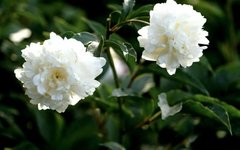
Daily Herb Study
Bai
Shao
Blood
Supplement
1
Introduction to Chinese Medicine
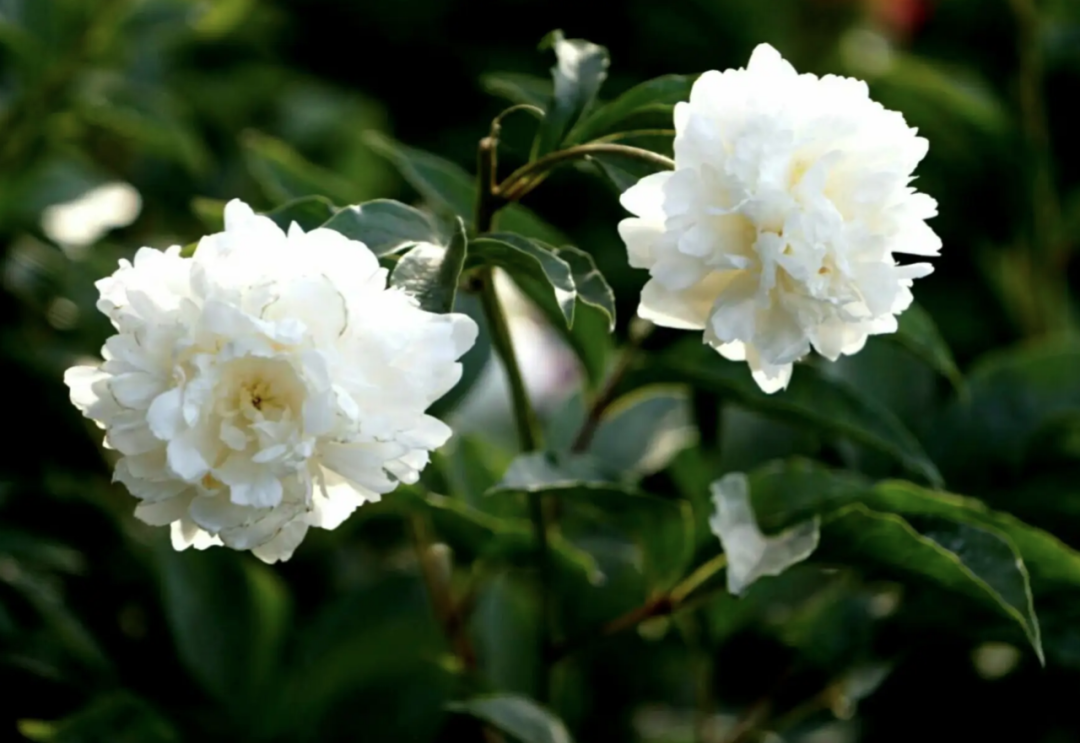
Also known as: Bai Shao Yao (White Peony), Jin Shao Yao (Gold Peony).
Taste and Properties: Bitter, sour, slightly cold. Enters the Liver and Spleen meridians.
Functions: Bitter, sour, slightly cold. Enters the Liver and Spleen meridians.
Category: Blood Supplementing Herbs
Bai Shao, the name of the herb, is the dried root of the plant Paeonia lactiflora, belonging to the Ranunculaceae family. It is harvested in summer and autumn, cleaned, with the head, tail, and fine roots removed, boiled in water, and then peeled or boiled again before drying. It has the effects of nourishing blood, regulating menstruation, astringing yin and stopping sweating, softening the liver and alleviating pain, and calming liver yang. It is commonly used for blood deficiency, irregular menstruation, spontaneous sweating, night sweats, flank pain, abdominal pain, limb cramps, headache, and dizziness.
2
Chinese Medicine Verse
Bai Shao is sour and cold, can both astringe and supplement,
For dysentery and abdominal pain, do not use for deficiency and cold.
3
Common Combinations
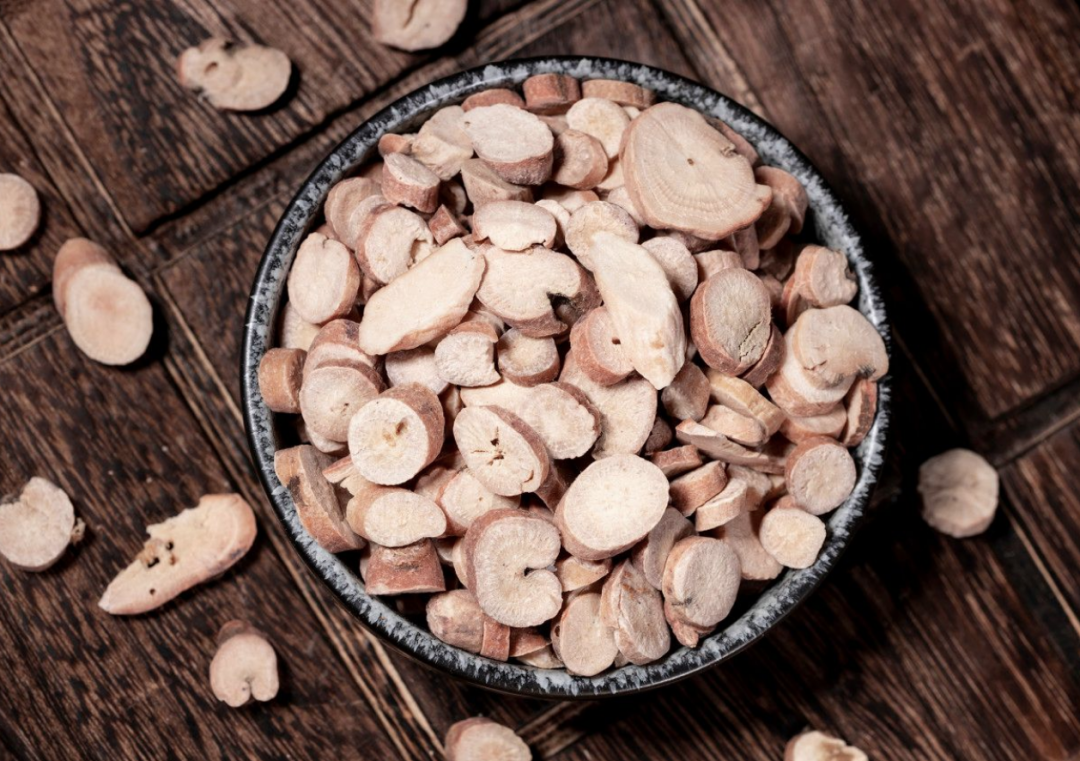
Bai Shao with Gan Cao (Licorice)
Bai Shao has a sour and cold nature, can nourish blood and astringe yin, soften the liver and alleviate pain (for liver yin deficiency and insufficient liver blood causing pain); Gan Cao has a sweet and neutral nature, can strengthen the spleen and benefit qi, alleviate urgent pain (to relieve more acute pain symptoms).
These two herbs combined can sour and sweeten to nourish yin, having the effect of softening the liver and alleviating pain, used for treating disharmony between the liver and spleen, abdominal pain, and limb cramping pain caused by insufficient nourishment of the tendons and vessels.
Bai Shao with Gui Jia (Tortoise Shell)
Bai Shao excels at astringing yin and clearing heat, while Gui Jia is good at nourishing yin and subduing yang (by replenishing yin fluids to suppress excessive rising yang).
These two herbs combined can enhance the effects of astringing yin and subduing yang, softening the liver and calming wind, suitable for dizziness and headaches caused by liver and kidney deficiency, and for alternating contractions of the hands and feet due to heat damaging fluids and internal wind.
Bai Shao with Shi Jue Ming (Abalone Shell)
Bai Shao excels at nourishing blood and softening the liver, while Shi Jue Ming is good at calming the liver and subduing yang (suppressing excessive rising yang within the liver).
These two herbs combined have the effect of benefiting liver yin and calming liver yang, suitable for headaches and dizziness caused by yin deficiency and yang excess.
Bai Shao with Mu Xiang (Costus Root)
Bai Shao excels at nourishing blood, softening the liver, and alleviating pain, while Mu Xiang is good at moving qi and alleviating pain (by regulating the body’s qi mechanism to relieve pain).
These two herbs combined have the effect of moving qi and blood, alleviating urgent pain, suitable for abdominal pain and diarrhea caused by qi and blood stagnation.
Bai Shao with Gou Qi Zi (Goji Berries)
Bai Shao excels at nourishing blood and softening the liver, alleviating urgent pain; Gou Qi Zi is good at benefiting the kidneys and nourishing essence, nourishing the liver and brightening the eyes.
These two herbs combined have the effect of nourishing blood and softening the liver, benefiting the kidneys and nourishing essence, suitable for dizziness and blurred vision, and dry eyes caused by liver and kidney yin deficiency.
4
Distribution Areas
Distribution regions:
Found in Northeast, North China, Shaanxi, and Gansu. Cultivated in many cities and towns.
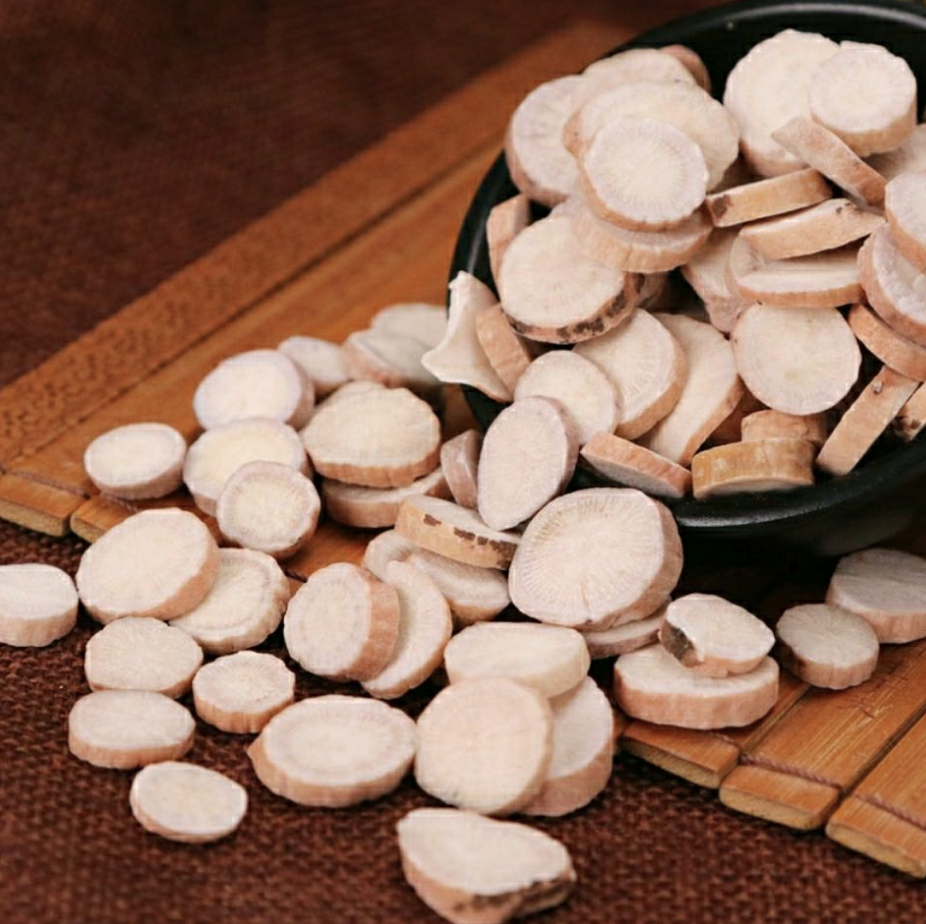
5
Folklore
During the Eastern Han Dynasty, the divine physician Hua Tuo established a medicinal herb garden, dug a medicinal pool, built a pharmacy, and cultivated medicinal herbs, teaching the techniques of planting and processing Chinese medicinal materials. One day, a traveler gifted him a peony plant, which he planted in front of his house. After tasting the leaves, stems, and flowers of this peony, he found them ordinary and without medicinal properties, so he did not use them for treatment. One night, while reading under the lamp, he suddenly heard a woman’s crying. He looked up and saw a beautiful woman in the moonlight outside the window, seemingly aggrieved, crying there. Hua Tuo was puzzled, opened the door to go out, but saw no one, only the peony standing where the woman had been. Hua Tuo thought: could it be that this is the woman from earlier? He looked at the peony, shook his head, and said to himself, “You have no remarkable qualities, how can you be used as medicine?” He turned and returned to his reading.
Unexpectedly, just as he sat down, he heard the woman’s crying again. When he went out to check, it was still the peony. This happened repeatedly. Hua Tuo found it strange and woke his sleeping wife, describing the incident in detail. His wife looked out the window and said, “Every grass and tree in your hands becomes a good medicine, saving countless lives. You have never used this peony, so it must feel wronged.” Hua Tuo laughed and said, “I am well-versed in thousands of formulas and herbs, and I can clearly distinguish their medicinal properties. I know what to use and have not missed anything. I have tasted the flower, leaves, and stem of this peony multiple times, and it truly cannot be used as medicine. How can it feel wronged?” His wife, seeing him somewhat impatient, did not pursue the matter further.
Days later, his wife suffered from blood collapse and abdominal pain, and the medicine was ineffective. She secretly dug up the peony root and boiled it to drink. Within half a day, her abdominal pain gradually ceased. She told Hua Tuo about this, and he realized he had indeed wronged the peony. Later, Hua Tuo conducted many detailed experiments on the peony and discovered that it not only can stop bleeding and invigorate blood but also has analgesic, nourishing, and menstrual-regulating effects.
6
Summary from Ancient Texts
“Dian Nan Ben Cao”: Stops liver qi counterflow pain, nourishes the heart, liver, and spleen blood, smooths the meridians, and descends qi, stopping liver qi pain.
“Ben Cao Gang Mu”: “Bai Shao Yao benefits the spleen, can drain wood from the earth.” “Stops dysentery and abdominal pain with a heavy feeling afterward.” “Ben Cao Bei Yao”: “Nourishes blood, drains the liver, benefits the spleen, astringes liver yin, treats pain from blood deficiency.”
“Ben Cao Zheng Yi”: “Nourishes blood, benefits the true yin of the liver and spleen, and collects the scattered spleen qi and rampant liver qi, thus it is Bai Shao; expels blood stasis, breaks accumulations, and descends, thus it is Chi Shao. Therefore, Bai Shao is used to nourish yin and blood, and moisten the liver and spleen; Chi Shao is used to invigorate blood and dispel toxins.”
“Shen Nong Ben Cao Jing”: Bitter, neutral. Treats evil qi abdominal pain, removes blood stasis, breaks hard accumulations, cold and heat, hernia, stops pain, benefits urination, and boosts qi.
“Ben Cao Jing Ji Zhu”: Bitter, sour, neutral, slightly cold, with slight toxicity. Treats evil qi abdominal pain, removes blood stasis, breaks hard accumulations, cold and heat, hernia, stops pain, benefits urination, boosts qi. Smooths blood vessels, alleviates pain, disperses evil blood, expels stagnant blood, removes water qi, benefits the bladder and intestines, resolves abscesses, treats seasonal cold and heat, evil qi, abdominal pain, and low back pain.
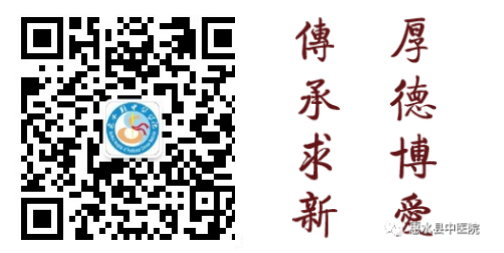
Scan the QR code to follow this public account
Source: Longjiang Traditional Chinese Medicine Culture(Some images in the text are sourced from the internet, for non-commercial use only, for public welfare and popular science. If there is any infringement, please contact for removal)


Huishui County Traditional Chinese Medicine Hospital Contact Numbers
EmergencyDepartment: 0854-6280855
General Surgery: 0854-6280670
Orthopedics: 0854-6281973
Proctology, Dermatology (Liver and Gallbladder): 0854-6230118
Cardiovascular and Cerebrovascular Diseases: 0854-6283080
Pulmonary Diseases: 0854-6283189
Geriatrics, Endocrinology: 0854-6281512
Dialysis Room: 0854-6282912
Spleen and Stomach Diseases, Rheumatology and Kidney Diseases: 0854-6230630
Intensive Care: 0854-6280843
Acupuncture and Tuina: 0854-6282127
Obstetrics and Gynecology: 0854-6281291
Pediatrics: 0854-6531035
Rehabilitation: 0854-6283176
Physical Examination: 0854-6283105
Otorhinolaryngology: 0854-6281793
Anesthesia: 0854-6280603
Pain Management: 0854-6230085
Traditional Chinese Medicine Outpatient Treatment Room: 0854-6230021
Pre-hospital Emergency: 0854-6289999
Second Outpatient Department: 0854-6223500

